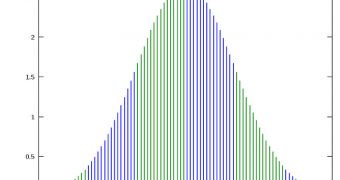A group of scientists from the University of California in Davis (UCD) announces the development of a new test, which can be used to accurately gage a number of traits pertaining to a person's intelligence. The team says that its approach, which relies on looking at the working memory capacity of individuals, is a clear indicator of various intelligence traits, such as abstract problem-solving and social intelligence. At the beginning of its study, it established that the most important thing about intelligence was the ability to compile and discern between numerous thoughts and memories at the same time, LiveScience reports.
The researchers explain that the main role of the working memory is to temporarily store new data and information for immediate use. After a certain time passes, the knowledge is either stored in the long-term memory (if the brain decides it's worth being remembered), or is discarded. The UCD group has not yet tested to see whether its new system works on the general one. However, if it does, study researcher Steven Luck says that, “I could predict an individual's overall intellectual ability essentially with 79-percent accuracy if you tell me what their working memory capacity is.”
If the correlation is found to hold for the general population as well, then this could give researchers a means to do something that was considered science-fiction just a few years ago, namely a way of improving an individual's intelligence. This conclusion is based on the fact that previous studies have demonstrated that working memory can be improved. If this memory is indeed linked to overall intelligence, then there is no reason to believe that improvements in one will not affect the other. Details of the new investigation will be published in the upcoming June issue of the top-rated scientific journal Archives of General Psychiatry.
“If you can't hold as many items in mind, it may affect your ability to carry out complex procedures because the goals and the procedures themselves compete with items you are trying to remember,” University of Missouri cognitive scientist Nelson Cowan, who was not a part of the investigation, explains. The UCD team believes that intelligent people, and those with a high working memory capacity implicitly, are capable of ignoring distractions better than their peers. This makes them better equipped to remember relevant information, and allows them to get rid of useless data more efficiently.

 14 DAY TRIAL //
14 DAY TRIAL //